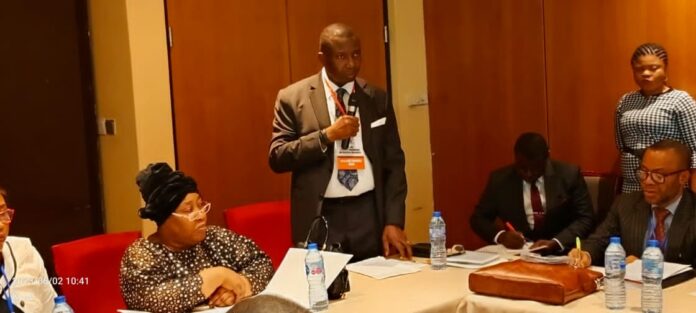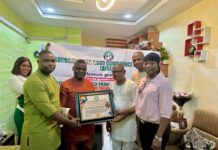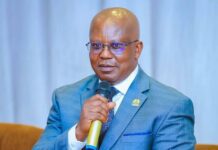Mr Okon Okon, Executive Chairman, Akwa Ibom State Internal Revenue Service, with the State Chief Judge, Hon. Ekaette Obot, during a workshop for select Judges in Akwa Ibom State.
By Substance Udo-Nature
The committed drive and unshaken focus of the Akwa Ibom State Internal Revenue Service (AKIRS), under the goal-oriented chairmanship of Mr. Okon Okon, to sustain the momentum of growth the agency has witnessed in the past five years through collaborative engagements were once again demonstrated at the just concluded training on taxation matters for judges in Akwa Ibom State.
The 3-day training programme which had as theme: CONTEMPORARY ISSUES IN TAXATION, packaged essentially for Revenue Judges and select High Court Judges in Akwa Ibom State, lasted between Wednesday, 2nd to Friday, 4th August, 2023 at the Ibom Icon and Golf Resort, Nwaniba Road, Uyo, Akwa Ibom State. According to Mr. Okon, the training has been strategically designed to come in series for select judges in the State, last week’s edition being the first in the series.
The event was declared open by the Chief Judge of Akwa Ibom State, Hon. Justice Ekaette Obot, who also gave the keynote. In attendance were twelve participants, including tax administrators and Management Staff of AKIRS and four resource persons who are celebrated authorities in their respective areas of expertise, selected from high profile offices and States across the country, to espouse the nitty-gritty of the programme contents.
Emphasizing on the need for the training, Mr. Okon, in his address, said it was necessary a forum for interface be created for tax administrators and judges in the State, to clear some grey areas in tax management and jurisprudence, with a view to minimizing or reaching middle grounds on prevailing conflicts existing between local, state and federal governments.
Hence, the selection of the best minds in tax economics and law as resource persons to lead discussions.
Commending Mr. Okon for the thoughtful and innovative initiative, Justice Ekaette Obot, observed that it was time such a training was held for judges considering the many nuances and conflicts in taxation administration and jurisprudence in the State.
Acknowledging taxation as a vital component of generating government revenue and providing essential services, she posited that it serves as a fundamental pillar in shaping the economic landscape of any society. Hence, as a bastion of justice, the Judiciary is indispensable and inherently connected to tax management.
To wit, “The Judiciary plays a crucial role in upholding the principles of justice, equity, and fairness through interpreting laws and resolving tax disputes. Therefore our judges and magistrates must possess the necessary knowledge and skills to handle contemporary tax matters”. The State Chief Judge further reasoned that periodic training and retraining for the judiciary became necessary because taxation remains an evolving concept and field, susceptible to constant reviews due to changes in policy, law, and administration.
Categorically in her summation, Justice Obot stated that the training will outline “a well-curated training programme to enhance the understanding of statutory and constitutional frameworks governing taxation, empower judges with insights into mechanisms for resolving tax disputes, and provide an overview of the legal framework for taxes collected by State and Local Governments…explore options for tax prosecution, and equip judges with the rudiments of the power to distrain administrative and pre-judicial procedures”.
READ: AKIRS holds training for Joint State Revenue Committee
A total of seven papers were presented across the three days, supplemented with fora for discussions, questions and answers; and a communique in the end. The papers include Tax Dispute Resolution from Administrative, Statutory and Constitutional Perspectives (by Lead Presenter, Mr. Chukwuemeka Eze, Chairman, Tax Appeal Tribunal, South East Zone and Member, International Association of Tax Judges); Overview of Legal Framework of Taxes and Levies Collected By State Government (by Prof. Ezekiel Edem, Chartered Tax Practitioner; National President, Direct and Indirect Taxation Training Institute of Nigeria, etc.); Application for and Enforcement of Distrain Orders by Courts to Recover Unpaid Taxes (by Prof. Jack Osimiri, Adjunct Professor of Taxation, University of Calabar; Principal Partner, Osimiri & Co. – Firm of Solicitors).
Others were End-to-End Processes in Tax Administration (by Prof. Ezekiel Edem); Jurisdiction Issues in Enforcement of State Taxes (by Prof. Jack Osimiri); Fundamentals of Tax Recovery by State Internal Revenue Services (by Dr. Ekokoi Solomon, Senior Lecturer, Faculty of Law, University of Uyo); and Tax Prosecution and Its Innovation as an Option in Tax Recovery (by Mr. Chukwuemeka Eze). Because judges need physical fitness to be very active, there was Fitness Talk (by Barr. (Mrs.) Uwem Okon).
Considering the rich resource of paper presenters, the impact of the training was consequential. Participants were reminded of what they already knew, exposed to current issues and substantive resolutions they ought to know, and unsparingly equipped for better understanding of taxation matters and dynamics of jurisprudence. Exponentially, the training served as a clearing house for extant and current disputations or conflict areas, and thereby realigned frameworks.
According to Mr. Chukwuemeka Eze, “Queries about who should collect what, where, why, and for whom” were all made to pass through the furnace for refinement and pragmatic application. There is no telling that whether at state or federal levels, tax matters have been constant bones of contention and recurring decimal amongst the three tiers of government in the country. Conversely, the controversies have an age-long trail. For instance, in 2021, a Federal High Court ruled that States had the powers to collect VAT.
However, the federal government bluffed the judgment and continued to collect VAT. Former President, Muhammadu Buhari even went ahead to incorporate VAT collection in the Finance Act 2021. This move puts the federal government on collision course with Southern Governors’ Forum.
Memorably, in support of the Court’s substantive judgment, on the 68 amendments recommended by the Joint Senate and House of Representatives’ Special Ad Hoc Committee on the Review of the 1999 Constitution, both chambers voted in favour of the states, endorsing that Value Added Tax not be included in the Exclusive List. A total of 95 senators registered to vote, and 85 actually voted. While 41 voted in favour of VAT to be collected exclusively by the federal government, 44 voted against that proposition.
Hence, the bill failed short of the minimum 73 votes.
In the Green Chambers, about 209 voted to retain VAT in the concurrent list, while 91 voted against. The Akwa Ibom State Government, through its Information Commissioner, Barr. Iniobong Ememobong, like his counterpart in Lagos, Gbenga Omotoso, had hailed the National Assembly for its bold and fair position, describing it as a “step in the right direction”. Other instances abound.
How therefore satisfying it was to see how well the resource persons at the recent training masticated the bones in the meat of discourse and fortified the first-line participants with quality inputs and tools for future engagements. The grand expectation is that informed arguments and sounder judgments that promote fairness and equity shall increasingly become the norm, and energy-sapping legal fireworks of the past shall have been reduced to the very barest.
Like Justice Ekaette Obot rightly observed, all credit to the Board and Management of Akwa Ibom State Internal Revenue Service for its discretion, innovativeness, administrative acumen and foresight in this regards. For the emphasis, with the conflicts areas removed or drastically reduced, combined with the breakthroughs, focus and professionalism Okon Okon has injected into AKIRS, the future is indeed brighter for Akwa Ibom State.
















